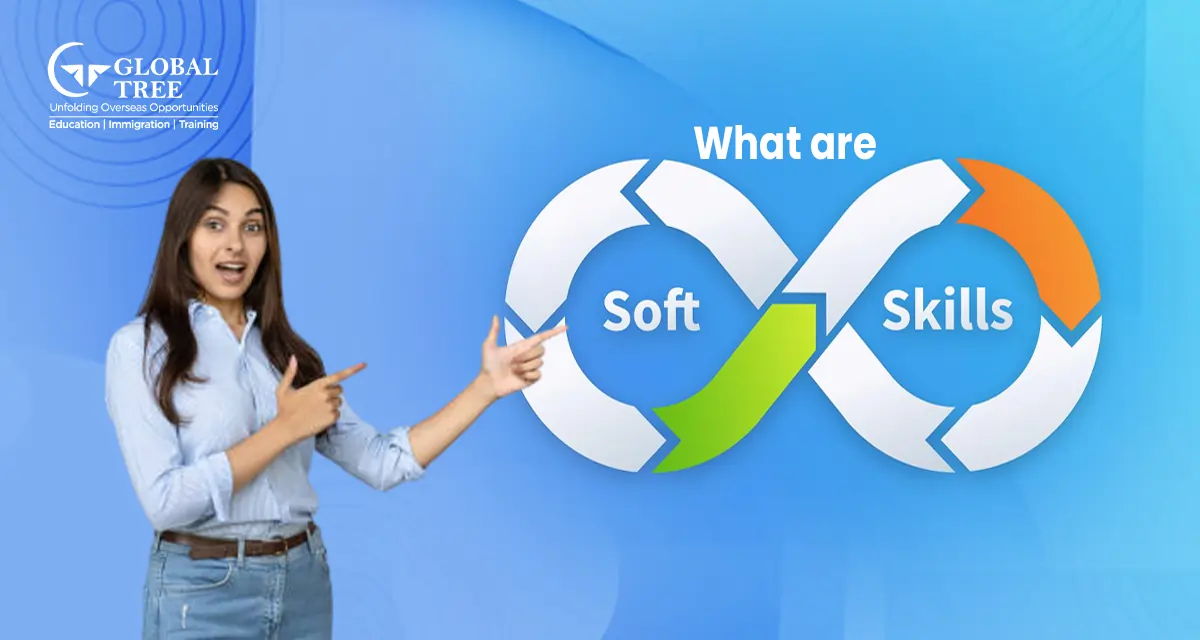What are Soft Skills: Secret Weapon for Career Success

What are Soft Skills?
Hello there! Have you ever wondered what sets apart a good professional from a great one?
It's not just the technical know-how; it's the often-underestimated power of soft skills.
Join us on a comprehensive journey to unravel the magic of these elusive yet essential human attributes that can shape your destiny.
Section 1: The Symphony of Soft Skills
Defining the Intangible
Picture this: you're at a meeting, armed with all the technical knowledge you need, but somehow, your message falls flat. Enter soft skills - the unsung heroes that include communication, empathy, teamwork, and adaptability. These aren't just words; they're the notes that compose the beautiful symphony of your interactions.
In the grand orchestra of life, soft skills form the melody that resonates beyond the confines of the workplace. They're the subtle nuances that elevate an individual's ability to connect, collaborate, and thrive in various environments. To truly understand their impact, let's delve into each key soft skill and explore how soft skills contribute to the harmonious symphony of our lives.
Section 2: The Dance of Key Soft Skills
Smooth Moves - Communication Skills
In a world buzzing with information, being able to communicate effectively is like having the coolest dance moves at a party. It's not just about talking; it's about connecting, making your ideas groove with others, and creating a conversation that leaves an impression.
Effective communication involves more than just words—it's about body language, tone, and active listening. Imagine a dance where each step is perfectly timed and every movement tells a story. That's the dance of communication, a soft skill that transcends verbal exchanges and transforms mere conversations into compelling narratives.
Emotional Intelligence - The Tango of Understanding
Ever wished you could navigate the intricate dance of emotions with finesse? Welcome to the tango of emotional intelligence! This soft skill involves not only understanding your own emotions but also gliding seamlessly through the emotional landscapes of others. It's the dance that builds bridges and fosters meaningful connections.
Emotional intelligence is the music that guides our interactions, helping us navigate the delicate nuances of human emotions. Like a skilled dancer, an emotionally intelligent individual can adapt their steps to the rhythm of different emotions, creating an atmosphere of trust, empathy, and understanding.
(Read More: A list of Idioms with various examples for an effective communication)
Teamwork - Choreographing Success
Imagine you're part of a team, each member moving in sync to achieve a common goal. That's the power of teamwork - a choreography of skills, ideas, and personalities. It's about more than just playing your part; it's about harmonizing with others to create something extraordinary.
Teamwork is the dance where individual strengths blend seamlessly, creating a collaborative masterpiece. Each team member contributes a unique set of steps, and together, they choreograph success. It's a dance that requires not only skill but also a willingness to synchronize and support each other.
Adaptability - The Cha-Cha with Change
Change is the only constant, right? So, why not learn the cha-cha of adaptability? It's about being light on your feet, embracing new rhythms, and confidently navigating the dance floor of uncertainty.
Adaptability is the dance that allows us to thrive in ever-changing environments. Just like a skilled dancer adjusts their steps to match the music, an adaptable individual embraces change with enthusiasm. It's the ability to pivot gracefully, to learn new routines like learning German language, and to find rhythm in the unfamiliar.
Section 3: The Drama of Why Soft Skills Matter
Career Spotlight: The Soft Skill Showdown
Lights, camera, action! In the spotlight, it's not just your technical skills that shine. Employers are increasingly drawn to candidates with a flair for soft skills. It's the showstopper that can elevate your career to new heights.
In today's competitive job market, technical competence alone doesn't guarantee success. Employers recognize the importance of soft skills in the workplace, enhancing teamwork, and ensuring effective communication. The spotlight is on individuals who can not only excel in their specific roles but also contribute to the overall harmony of the workplace.
Effective -> Communication
To be or not to be a great communicator? That is the question. Whether you're presenting a killer pitch or navigating the intricate plots of workplace dynamics, effective communication is the Shakespearean drama that can make or break your success story.
Effective communication skills isn't a monologue; it's a dynamic dialogue that engages and resonates. In the drama of the workplace, the ability to articulate ideas clearly, express opinions with tact, and listen actively takes center stage. It's the difference between a captivating performance and a forgettable one.
Interpersonal Relationships
Love them or hate them, relationships play a starring role in our lives. From networking events to project collaborations, it's all about building relationships that stand the test of time.
Soft skills in the realm of relationships go beyond the professional sphere; they extend to personal interactions as well. Whether you're forming connections with colleagues, clients, or friends, the ability to empathize, communicate effectively, and resolve conflicts contributes to the heartwarming storyline of your relationships.
(Read More: How to score high marks on GRE exam?)
Conflict Resolution: Soft Skills on Stage
Picture this: a heated office disagreement. Enter soft skills - the actors on the stage of conflict resolution. Through effective communication, empathy, and negotiation, soft skills play a pivotal role in turning workplace conflicts into opportunities for growth.
Conflict is an inevitable part of any human interaction, but how it's resolved can define the narrative. Soft skills, particularly those related to conflict resolution, enable individuals to navigate disagreements with grace and professionalism. It's the art of turning workplace tension into a constructive dialogue, fostering understanding and collaboration.
Section 4: The Canvas of Developing Soft Skills
Mirror, Mirror: The Art of Self-Assessment
Ever stood in front of the mirror and practiced your winning smile? Self-assessment is like that, but for your soft skills. Take a moment to reflect on your strengths and areas for improvement. It's the first step in the masterpiece of personal development.
Self-assessment is the mirror that reflects the current state of your soft skills. It involves introspection, honest evaluation, and a commitment to continuous improvement. Just as a dancer reviews their performance to refine their technique, self-assessment allows you to identify areas where your soft skills can shine even brighter.
The Workshop: Where Soft Skills Take Center Stage
Welcome to the workshop, where you're not just a spectator but an active participant. Engage in activities that challenge your communication, teamwork, and adaptability. It's the hands-on rehearsal for life's big performance.
Workshops provide a structured environment for soft skill development. Whether it's through team-building exercises, communication drills, or problem-solving simulations, these activities mimic the real-life scenarios where soft skills come into play. The workshop is your practice ground, allowing you to refine your moves and gain confidence in your ability to navigate various situations.
The Mentorship Mingle
Imagine having a wise mentor guiding you through the maze of soft skills. Seek out mentors who can share their experiences and provide valuable insights. It's like having a seasoned dance partner showing you the steps to success.
Mentorship is the guidance that accelerates your soft skill development. A mentor, with their wealth of experience, can offer valuable perspectives, share anecdotes of their own challenges, and provide constructive feedback. It's a dynamic partnership where you not only learn from their wisdom but also gain the confidence to apply your soft skills in real-world scenarios.
Continuous Learning: The Never-Ending Rehearsal
Soft skills, like any other skill, require practice and refinement. The journey doesn't end at the workshop; it's a continuous rehearsal. Attend seminars, read books, and participate in online courses to stay on top of the ever-evolving world of soft skills list.
(Read More: IELTS vs. TOEFL: which is easier to crack?)
Continuous learning is the never-ending rehearsal that keeps your soft skills sharp. Just as a dancer hones their craft through regular practice, staying updated on the latest trends, theories, and best practices in soft skills ensures that you remain at the forefront of your personal and professional development.
Conclusion
And there you have it, the magical world of soft skills – where effective communication skills, emotional intelligence, teamwork, adaptability, and conflict resolution dance together in perfect harmony. As you embark on your journey to master these essential human attributes, remember that the stage is yours, and the spotlight awaits. So, step into the rhythm of soft skills and let the dance of personal and professional success begin!
In the grand finale of this exploration, we've witnessed the intricate dance of soft skills, from the smooth moves of communication to the tango of emotional intelligence, the coordinated choreography of teamwork, and the adaptive cha-cha with change. We've seen how these skills take center stage in the drama of professional success, playing pivotal roles in effective communication, relationship-building, and conflict resolution. You can also add a list of soft skills while writing the SOP for various courses like an MBA. As you embark on your own journey of soft skill development, remember that the canvas is vast, the workshop is dynamic, mentorship is invaluable, and continuous learning is the never-ending rehearsal that propels you toward mastery.
So, here's to the ongoing dance – may your soft skills always be in tune, your steps agile, and your performance a standing ovation in the grand theater of life.
FAQS - Frequently Asked Questions about Developing Soft Skills
Can you improve your soft skills?
Soft skills are socio-emotional skills, but that doesn't mean they are not trainable! There are plenty of courses and training available online or in-person to help individuals work on their soft skills. From teamwork communication to presentation skills, there's training out there for everyone.
What are the types of soft skills?
Soft skills include interpersonal (people) skills, communication skills, listening skills, time management, problem-solving, leadership, and empathy, among others. 1 They are among the top skills employers seek in the candidates they hire because soft skills are important for just about every job.
Are soft skills natural?
They directly relate to how well you can work with and interact with others. Unlike hard skills, soft skills are more difficult to learn, given their innate nature. Soft skills are applicable across industries and to any profession.
Who needs soft skills?
If you are a small business owner or self-employed, soft skills can help you find, attract, and retain clients. Highly-developed presentation skills, networking abilities, and etiquette awareness can help you win new clients and gain more work from existing clients.









